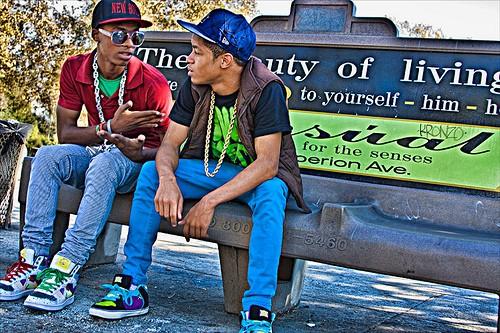
Back in November, I was lucky to attend an excellent lecture/presentation by Wayne Marshall, who is currently a Mellon Fellow in the Foreign Languages and Literatures department here at MIT. His talk, entitled Skinny Jeans and Fruity Loops, explores dance subcultures across the globe and examines how technology is impacting these networked communities:
What can we learn about contemporary culture from watching dayglo-clad teenagers dancing geekily in front of their computers in such disparate sites as Brooklyn, Buenos Aires, Johannesburg, and Mexico City? How has the embrace of "new media" by so-called "digital natives" facilitated the formation of transnational, digital publics? More important, what are the local effects of such practices, and why do they seem to generate such hostile responses and anxiety about the future?
Wayne's talk is available via audio below (with a direct link to the mp3 here).
Of course, the presentation relied heavily on audiovisuals, so I've embedded some relevant dance videos below. Please enjoy the talk, or dance along!
Tecktonik
Jerkin
Flogging
Finally, if you're interested, I've appended my own notes from the talk in this post, after the jump.
Wayne Marshall is an ethnomusicologist, blogger, DJ, and, beginning this year, a Mellon Fellow in Foreign Languages and Literatures at MIT. His research focuses on the production and circulation of popular music, especially across the Americas and in the wider world, and the role that digital technologies are playing in the formation of new notions of community, selfhood, and nationhood.
wayne marshall
mellon postdoctoral fellow
waynem@mit.edu
---
fruity loops
---
brave new world music
- extending work on migration of people media and ideologies into age of social Web (ethonographic and interpretive)
- translocal circuilation and local meaning; how media (esp music) works in fashioning of selfhood/nationhood
- the cutltural work being done by the vibrant dynamic degree of p2p industry c/o digital natives in networked publics
- implications for education/policy/community
- interdiscipliinary perspectives: anthro/ethno of globalization, digital humanities & social sciences, media & cultural studies
---
digital media ecologies / media topologies
public spheres that are created through participation/sharing/knowledge
mimi ito, craig watman (?); palfrey/gasser, jenkins
---
sartorial self-presentation
publicness of dance videos: blurring of public/private: outside, or in homes, etc.
---
how does what happens in diaspora work themselves back home?
---
how we 'look': digital ethnomusicology
- how is music driving technology? (platforms, devices)
- how is technology affecting musical practice?
- how do values inform and emerge from practice?
what we 'see'?
- p2p industry, vibrant culture, new publics
- uncritical celebration of the global and digital
- false dichotomies: global/local, digital/meaty, public/private
---
case study #1: jerkin
- efflorescence of dance scenes/styles (especially african-american regional forms) in the age of youtube
- communities of friendship/affinity & interest, (trans)local peers
- social Web media topography / net resources:
- myspace (diy, read-write, 'theatrical & aspirational')
- youtube (hosting service, SNS [peers & global public], revenue source, learning lab [dance, FL], mirror-stage)
- twitter / facebook (promotion, conversation)
- ustream / justin.tv (lifesharing/casting, chat, promo)
- digitaldripped.com (distribution in post-scarcity age)
- jerkinradio.com (p2p industry, connection)
---
inherently public: but when someone listens, infringing into the (essentially, private) conversation
"new boyz" - w/ popularity, myspace page visuals: enters into corporate culture
how cell phones play into social culture (new boyz music video)
fruity loops tutorials on youtube
READ KEVIN'S THESIS
---
jerkin as p2p industry, cultural work
- myspace/youtube as mirror-stage, site for play/performance
- kids who used to dance in front of mirror for themselves do it in front of their cameras for them and a few friends (and of course the world in turn)
- unsettling/undermining cultural mores, esp. re: race & gender
- "in defense of skinny jeans" (new boys interview)
- "white girl clothes" (a.b.a.)
- other criticism re: quality of productions
- "amateur" aesthetics vs. participatory culture
---
case study #2: floggers
- transnational/cross-lingual spread of techtonik (Fr), shuffle (Australia)
- importance of platforms: fotolog in Latin America / Argentina
- private/peer-practices, meganiches, & public spheres
- role of digital natives in driving tech/net: 17 year old with popular flog (eg., cumbio) finds herself in national spotlight
---
floggers as source of trans-national pride, national shame (sometime violence)
- selfidentification in/out of argentina, conflation w/ emos
- mainstream media, blog discourse, youtube commentary (tribus urbana, marikas, vs. cosmo-cool)
- why TCK/flog? why not rock, etc.?
---
never see the person's face in the video
- emphasize the feet
- public/private
use of plug & play effects: all they really need
"buy this software to get rid of this unlock message"
flogger fashion: androgynous
mexico's emo-bashing problem, thurs mar 27 2008 (Time)
---
conclusions?
- utopia/dystopia :: participation / commercialization :: community / narcissism (new boyz & cumbio today)
- do the digital flaneur dance! (why?)
- embodied culture in digital age; private/public mirror-stages; fluid, flexible, playful selves emerging from social Webs & networked publics, intruding on wider publics
- early adopters not in need of encouragement but facilitation (policy implications: education, net neutrality, DOPA, 3 strikes), esp given role of young people (of color) in driving tech/net use
- values: sharing as anchor of community (see, eg., youtube comments), savvy media co-producers, but not always (see, eg., youtube comments)
---
participatory culture & commercial culture: audio swap on youtube
role of dance: still about embodying culture
---
Q/A
christina:
participatory culture
platforms open: producers of platforms are not the ones participating




